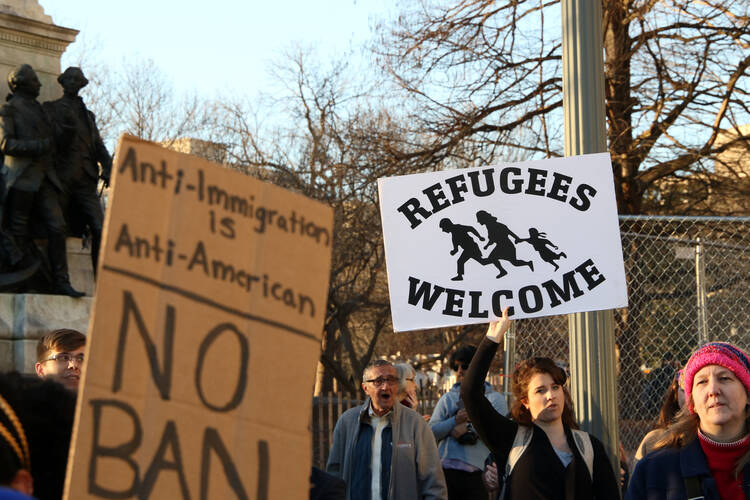How can priests preach in the age of Trump—without mentioning Trump?
A
priest friend who works at a parish in the Midwest confided recently
that he was finding it hard to preach these last two weeks. “It’s a
high-wire act,” he said.
On one level, his comments disturbed me. I get it, some parishioners at our parishes might be happy with the way things are going in this country, might have hoped for this in the first place. And maybe some of those parishioners are among the most generous, too. Money: It talks, and it also muzzles.
But if parish priests and other Catholics in the United States cannot stand up in this important
moment for the very people Jesus stood with—the marginalized and needy that Pope Francis keeps calling our attention to; the meek, the mourning, the poor in spirit and the hungry for righteousness described as “blessed” by Jesus in the Gospel reading the Sunday after the Trump administration’s travel ban was announced (ain’t no karma like Jesus Christ-karma)—we might as well pack up our Mass kits, turn out the church lights and permanently relocate to the beach. I am sure the UV rays and the rising waters won’t get too bad for at least the next couple years.
Yet it is also true that our politics right now so corrode our capacity for prayer and poetry that even just a hint of something slightly adjacent to a topic that might be able to be partially interpreted by some as perhaps related to a policy of the current president is transmogrified instantaneously into a furious Frankenstein’s monster of pro- or anti-Trump rhetoric. A homily should offer a word of welcome and invitation, an opportunity for a greater relationship with our Lord. But everything has become so heightened, it is hard to recognize such an invitation, let alone accept it. At every word we anticipate controversy. “Can you believe that guy, making us say that prayer together?!” “Um, Mom, that was the Our Father.”
Some might say, leave your politics at the door. Church is our blessed escape. And, personally, most of the time at Mass I just want to be in the quiet, nourishing, presence of our Lord. Spare me the 20-minute homilies. Nobody came here for that.
But no religion whose central symbol is a man nailed to a cross gets the luxury of claiming it is an oasis. The history of our salvation is equal parts divine love and social sin, scapegoating and forgiveness. And rather than assuring us that we will not have to take the road to Jerusalem ourselves, the life of Christ promises that if we are faithful, we are almost definitely going to end up walking it with him.
Finding the peace, the grace, the presence of God in that conflict—that is the challenge before us as homilists always, but maybe more evidently now. Not to run from the present nor rally to a side but to wade into our shared discomfort and darkness with the Lord and to ask him to lead us to some light.
It is never going to be the right choice to mention President Donald J. Trump in a homily.
It is never going to be the right choice to mention President Donald
J. Trump or any other politician in a homily, even if you admire them.
For all but the deftest of us, it is probably almost never going to be
the right choice to mention most hot-button policies, either, or at
least not in the two- and three-word hyperbolic slogans by which they
are batted around. Political references are like off-ramps; they invite
listeners to drive away. And once they do, it can take a long time for
them to come back.
Maybe it is not even necessary for homilists to talk explicitly about the poor in our world right now (although I think Pope Francis might have some fun responses on a future airplane ride to that). So often it is not our words, our turns of phrase that we are there for, as much as offering some sense of God’s welcome, his invitation and call to loving mercy.
On one level, his comments disturbed me. I get it, some parishioners at our parishes might be happy with the way things are going in this country, might have hoped for this in the first place. And maybe some of those parishioners are among the most generous, too. Money: It talks, and it also muzzles.
But if parish priests and other Catholics in the United States cannot stand up in this important
moment for the very people Jesus stood with—the marginalized and needy that Pope Francis keeps calling our attention to; the meek, the mourning, the poor in spirit and the hungry for righteousness described as “blessed” by Jesus in the Gospel reading the Sunday after the Trump administration’s travel ban was announced (ain’t no karma like Jesus Christ-karma)—we might as well pack up our Mass kits, turn out the church lights and permanently relocate to the beach. I am sure the UV rays and the rising waters won’t get too bad for at least the next couple years.
Yet it is also true that our politics right now so corrode our capacity for prayer and poetry that even just a hint of something slightly adjacent to a topic that might be able to be partially interpreted by some as perhaps related to a policy of the current president is transmogrified instantaneously into a furious Frankenstein’s monster of pro- or anti-Trump rhetoric. A homily should offer a word of welcome and invitation, an opportunity for a greater relationship with our Lord. But everything has become so heightened, it is hard to recognize such an invitation, let alone accept it. At every word we anticipate controversy. “Can you believe that guy, making us say that prayer together?!” “Um, Mom, that was the Our Father.”
Some might say, leave your politics at the door. Church is our blessed escape. And, personally, most of the time at Mass I just want to be in the quiet, nourishing, presence of our Lord. Spare me the 20-minute homilies. Nobody came here for that.
But no religion whose central symbol is a man nailed to a cross gets the luxury of claiming it is an oasis. The history of our salvation is equal parts divine love and social sin, scapegoating and forgiveness. And rather than assuring us that we will not have to take the road to Jerusalem ourselves, the life of Christ promises that if we are faithful, we are almost definitely going to end up walking it with him.
Finding the peace, the grace, the presence of God in that conflict—that is the challenge before us as homilists always, but maybe more evidently now. Not to run from the present nor rally to a side but to wade into our shared discomfort and darkness with the Lord and to ask him to lead us to some light.
It is never going to be the right choice to mention President Donald J. Trump in a homily.
Tweet this
Maybe it is not even necessary for homilists to talk explicitly about the poor in our world right now (although I think Pope Francis might have some fun responses on a future airplane ride to that). So often it is not our words, our turns of phrase that we are there for, as much as offering some sense of God’s welcome, his invitation and call to loving mercy.




No comments:
Post a Comment